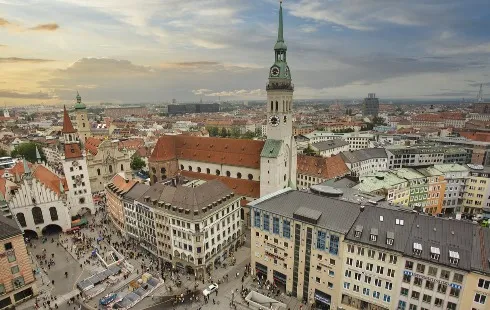
Gonadorelin Peptide: A Gateway to Understanding Endocrine Dynamics
Section: Science
 As with any major city, Munich's governance plays a crucial role in shaping the growth and development of the region. In this primer, we delve into Munich's ruling political party, shedding light on its ideology, policies, and influence on the city's socio-political landscape.
As with any major city, Munich's governance plays a crucial role in shaping the growth and development of the region. In this primer, we delve into Munich's ruling political party, shedding light on its ideology, policies, and influence on the city's socio-political landscape.
Christian Social Union (CSU): A Legacy of Stability
The Christian Social Union (CSU) is a conservative political party that has been the ruling power in Bavaria for over six decades. Established in 1945, the CSU has enjoyed an incredibly stable and dominant position in the state's politics, consistently winning majorities in the Bavarian Parliament. The party has played a significant role in shaping and maintaining Bavaria's conservative inclinations.
The CSU's Ideology and Policies
At its core, the CSU stands for Christian-social conservative ideals, advocating for family values, subsidiarity, and a market-oriented economy. The party's primary focus lies in addressing social, economic, and cultural matters from a conservative standpoint. Its policies are often designed to ensure a stable and prosperous Bavaria, emphasizing economic competitiveness, social order, and the preservation of Bavarian traditions and identity.
Economic Policy and Innovation
Bavaria, under the CSU's governance, has emerged as a powerful economic force in Germany and Europe as a whole. The party has prioritized fostering a business-friendly environment, encouraging entrepreneurship, and attracting investments. The region's support for innovation and technology advancement has successfully positioned Munich as a leading center for research and development. Bavaria currently boasts a robust economy, low unemployment rates, and a higher GDP per capita compared to the national average.
Investment in Education and Culture
Another area where the CSU has made significant strides is in the realm of education and culture. The party places great importance on maintaining a high standard of education while preserving Bavaria's cultural heritage. Bavaria is home to excellent educational institutions, renowned universities, and internationally acclaimed research centers largely due to the CSU's focus on providing adequate funding and support for education at all levels. Additionally, the CSU also promotes Bavarian traditions, cultural events, and landmarks as an essential part of the region's identity.
Conservation and Sustainability
Recognizing the importance of environmental conservation and sustainability, the CSU has been instrumental in developing and implementing policies to protect Bavaria's natural resources. The party has championed renewable energy projects, leading Bavaria to become a leader in terms of alternative energy sources. The picturesque landscapes, such as the Alps and numerous lakes, are cherished and preserved with the CSU's focus on balancing economic development and environmental protection.
Social Welfare and Immigration Policies
As the CSU is known for its conservative stance, it of course also values social welfare. Bavaria is regarded as having one of Germany's most comprehensive welfare systems, offering generous benefits and support to its residents. However, the party has been cautious about the impact of immigration on Bavarian society and has advocated for stricter controls on migration policy. The CSU has sought to balance integration and preservation of Bavarian culture by emphasizing the importance of respecting and adhering to societal values.
Conclusion
The Christian Social Union has had a profound impact on Munich and Bavaria, influencing policies that have shaped the region's development over the years. The party's long-standing governance has fostered stability, economic growth, innovation, and the preservation of Bavarian traditions. While they remain a conservative force, the CSU has shown an ability to adapt and respond to changing socio-political dynamics, ensuring Bavaria's continued success on a global stage. As Munich continues to evolve, the influence of the CSU will undoubtedly play a significant role in shaping the city's socio-political landscape for years to come.

Section: Science

Section: Health

Section: Arts

Section: Health

Section: Science

Section: News

Section: News

Section: Health Insurance

Section: Health

Section: News
Health Insurance in Germany is compulsory and sometimes complicated, not to mention expensive. As an expat, you are required to navigate this landscape within weeks of arriving, so check our FAQ on PKV. For our guide on resources and access to agents who can give you a competitive quote, try our PKV Cost comparison tool.
Germany is famous for its medical expertise and extensive number of hospitals and clinics. See this comprehensive directory of hospitals and clinics across the country, complete with links to their websites, addresses, contact info, and specializations/services.
The granddaughter of Claire Zachanassian makes a return to Güllen, the impoverished hometown of her late grandmother, for a performance. Having never fully engaged with her grandmother's past, she is eager to finally discover Güllen. The sound of her last name stirs the entire town into action.



No comments yet. Be the first to comment!